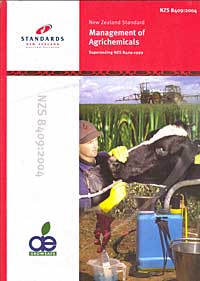NZS 8409:2004 Management of Agrichemicals
 Please note that NZS 8409 was updated in 2021. For key changes see the information provided at the time of publication or our FAQs page for the Standard.
Please note that NZS 8409 was updated in 2021. For key changes see the information provided at the time of publication or our FAQs page for the Standard.
The New Zealand Standard NZS8409:2004 Management of Agrichemicals is an approved code of practice under the HSNO and ACVM Acts.
It provides guidance to ensure that agrichemicals are used in a safe, responsible and effective manner, while minimising any adverse affects on the environment or human and animal health.
While this Standard supersedes NZS 8409:1999 Code of Practice for the Management of Agrichemicals, you should be aware that some Regional Councils still use the old Standard.
Most agrichemicals covered by this Standard are classified as hazardous substances under the Hazardous Substances (Minimum Degrees of Hazard) Regulations and, depending on their hazard classifications, will have a range of controls placed upon them.
Who is the Standard for?
This Standard is for all agrichemical users. It specifies the requirements for the commercial use of agrichemicals for:
- applicators
- contractors (aerial and ground application) and
- distributors (manufacturers, wholesalers and retailers).
The Standard covers, amongst others, agrichemicals for home and garden, nursery, turf, and amenity use, and fumigants. Some agrichemicals need to be handled by an Approved Handler. Knowledge of this Standard will help you meet the qualification criteria under the HSNO Regulations.
What is in the Standard?
The Standard is divided into seven sections:
- Introduction
- Management of agrichemicals
- Land transport of agrichemicals
- Storage and supply of agrichemicals
- Use of agrichemicals
- Disposal of agrichemicals and containers
- Emergency preparedness and management.
A series of appendices, divided into those considered compulsory to meet requirements and those providing general advice and supporting information to assist with compliance. All of the appendices are considered to be part of the approved Standard.
The standard uses a risk management approach for transport, storage, use and disposal as well as planning for, and dealing with, emergencies relating to agrichemicals.
'Compliance' versus 'Recommended'
The Standard has sections which are required and others which are for information:
- Mandatory sections (in order to comply with the Standard) use the word 'shall'.
- Sections which are for information and guidance use the word 'should' to indicate that compliance is recommended but not mandatory.
The appendices in the Standard are either normative or informative:
- Normative appendices, identified by the use of shall, must be complied with
- Compliance with informative appendices, included for information and guidance and characterised by should, is recommended but not mandatory.
 |
Copies of the Standard can be purchased from Growsafe or Standards New Zealand.
|